Croatian 'Cro Cop' Paralysed Dog Walks After Hip Surgery!
Croatian ‘Cro Cop’ posted a touching Facebook message to his fans: “They advised us to put her to sleep, but my dog is alive and well!”
‘Cro Cop’ Mirko Filipović's posts are often very popular, but a recent post particularly thrilled his fans because it is very touching, and how could it not be when one it is dedicated to one of his true loves: his dog Kora.
‘Cro Cop’ is known for treating his dogs like family members, and is especially emotionally attached to Kora because, at one point, he was advised to put her to sleep. Veterinarians did not give her any chance of recovery, but the "written off" dog eventually recovered and is now completely healthy, according to Zadarski on January 12, 2020.
Here is the Croatian boxer's complete post:
"Kora! My pet just turned 7 months old and was diagnosed with hip dysplasia 2 and a half months ago. Veterinarians said it was practically over for her. It was urgent to have artificial hips installed, because her situation was dire. Even then the euthanasia option was being suggested given the cost of surgery and the complexity of the rehabilitation Kori would have to undergo, which is demanding and complicated. And there is no guarantee that the surgery would succeed completely given the uncertain shelf life of artificial hips. Of course, 24-hour monitoring was necessary, because she must not run, jump or make any uncontrolled movement during recovery.
A friend referred me to a vet in Slovenia, Dr. Milan Matkea, a world-class expert and specialist in these cases. After reviewing the x-ray of Kora's hips, he said that he would operate and that he would not implant artificial hips. Instead he would only 'rotate her tendons and ligaments' if I have explained the procedure correctly. Basically, Kora has been operated on and has gone from a dog who was written off to one that is completely healthy today.
Today we went for our first walk. She walks completely normally and now we must gradually get her used to longer walks to strengthen the muscles that have atrophied. Six weeks after surgery, Kora has fully recovered. Rehab was difficult, although I was not very involved in that. Thank you to my wife Klaudija, who slept on the living room floor with Kora for 6 weeks, because Kora was not allowed to stay alone for a second until she had completely healed. I should also mention taking Kora outside to go to the bathroom, which was done with one hand holding a leash and the other with a towel tucked under her belly to reduce the load on her hind legs when walking.
Basically, Kora is healthy, recovering and alive today! For all of this I must thank Dr. Matkea. Thank you Dr. Matkea for everything you have done so that Kora alive and well and with us today."
Follow our Lifestyle page for updates on Croatian celebrities, their pets and veterinary medical advances.
Croatia EU Presidency: Zagreb Apartment Rentals Fail Expectations
The Croatia takeover of the six-month rotating presidency of the European Union has not impacted the real estate rental market in Zagreb the way many had expected, at least in terms of renting out high-priced attractive apartments in the center of the city and nearby areas.
Very High Zagreb Expectations Have Fizzled
As reported by ZagrebInfo on December 2, 2019; several Zagreb landlords had evicted their long-term tenants to cash in on higher Western EU monthly rental prices, leaving their stunned evicted tenants to scramble for alternative housing. Unfortunately, that much-hyped cash cow has failed to produce any real milk.
Realtors and Zagreb Landlords Surprised by Lack of Interest
“Expectations were very high, and many Zagreb residents have been calling us off the hook. They’ve eagerly left their information and addresses, and emphasized that they would move out of their apartments in top city locations immediately if they could rent them out for a half year, but there hasn’t been any interest. Seduced by the thought of a possible apartment shortage in Zagreb during the EU presidency, some owners even preemptively raised their rental prices,” observed Lana Mihaljinec Knežević, owner of Zagreb West Agency.
Boro Vujović, Director of the Opereta agency confirmed similar observations.
“The owners long-term apartment rental properties had big expectations, but nothing significant has happened. We have only rented two apartments for this purpose (EU government officials),” Vujović revealed to Korana Sutlić/Novac/Jutarnji List on January 12, 2020.
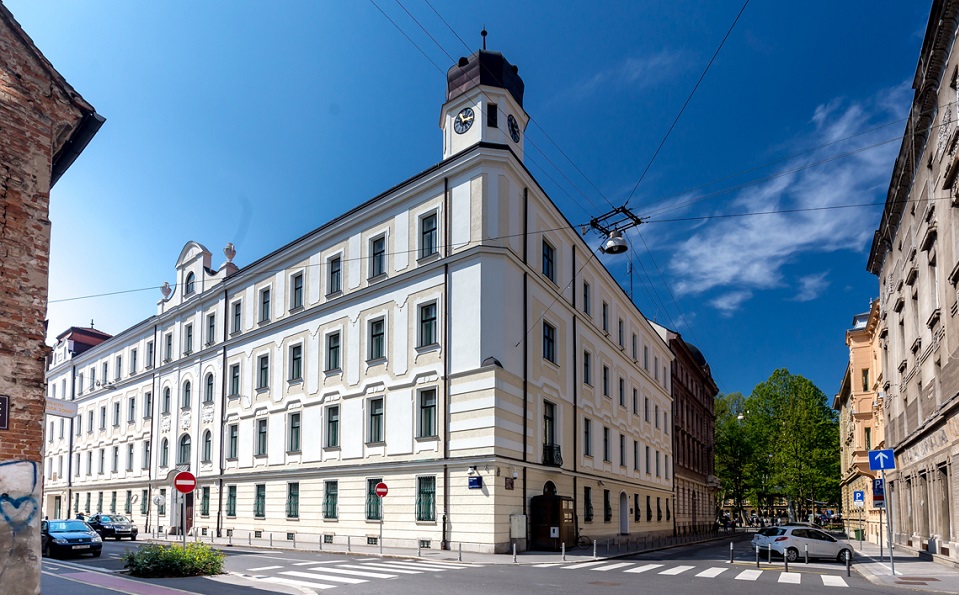
Zagreb West Agency
Croatia EU Administration Run Locally: Guests Not Long-Term
Lana Mihaljinec Knežević explained that the administration associated with the rotating presidency is run from Croatia with domestic resources. The guests who arrive from other EU states are not permanent guests, but occasionally show up to attend various meetings, summits and similar events.
Several apartments were reserved in the center of the city for these occasions, but nothing significant has happened for quite a while. These rentals (for EU government officials) can be counted on just one hand.
“For the time being, we just haven’t seen any interest in this area. We certainly expected interest, but nothing has happened. And we do not see an increase in the number of reservations compared with last year,” said Igor Kordić, co-founder of Irundo, a leading short-term rental company in Croatia. They handle several apartment rental properties in the center of Zagreb.
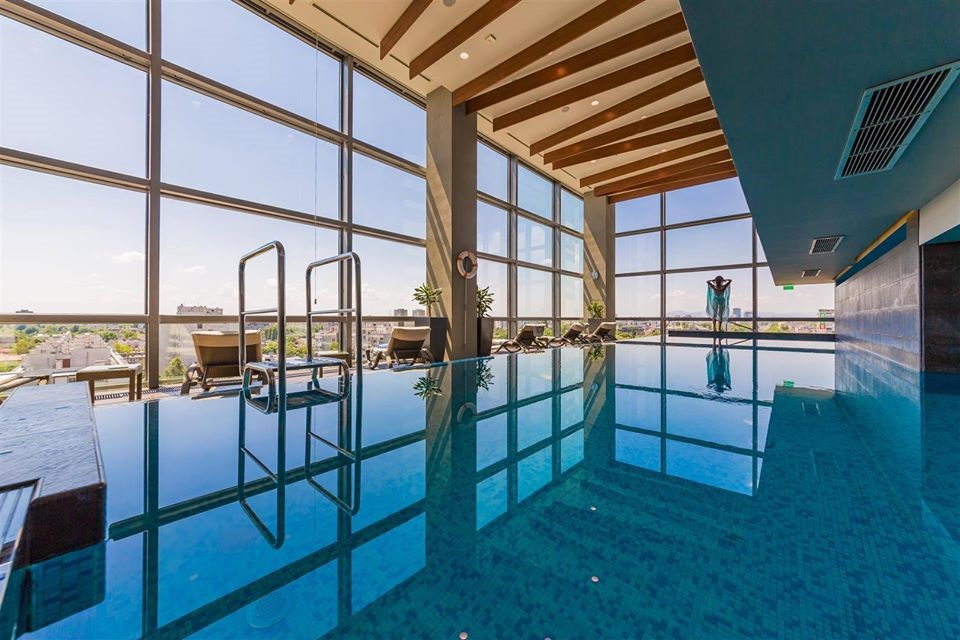
Hilton Double Tree Gets Fifth Star for EU Arrivals
Five Star Hotels in Big Demand: One Hotel Gets Fifth Star
Shortly before the beginning of the EU presidency, several ministries sought five-star hotels in Zagreb for short-term guest accommodations. For this reason, some hotels recently underwent upgrades, like the Hilton Double Tree Hotel, which became a five-star hotel.
HUP Zagreb indicated that highest category hotels, including The Westin Zagreb and Sheraton Zagreb, have generated the most interest during Croatia’s EU presidency. They are both reporting a high occupancy rate during the this 6-month period, as are their other high category hotels: Panorama Zagreb and International.
“Our hotels have a highly capable team of professionals who have hosted numerous international conferences and summits for many years, and our hotels, restaurants and conference halls are prepared for these upcoming events. Regarding our presentation of Croatia’s gastronomic options, we will be preparing special menus for the EU delegates to showcase our diverse selection of cuisine,” says Sara Valentić of the Marketing Department from the Croatian Consulate General in Zagreb.
Four Star Downtown Hotels Seeing Very Little Traffic
However, not all high-category hotels in Zagreb are in the same situation.
“We have not yet encountered any interested guests associated with the EU Council Presidency. It’s possible that one of them could occasionally stay with us for a short time, but we are not seeing that right now,” said Tomislav Kuliš , Director of the Palace Hotel, a four-star hotel located on Zrinjevac Park, right in the heart of the Croatian metropolis.
Follow our Travel page to keep updated on real and anticipated tourism opportunities in Croatia.
Croatian Filmmakers Vrdoljak: Debts for Failed 'General' Film
Goran Navojec and Mustafa Nadarević are among the most famous names on a list of people and companies to whom the producers, Antun and Andrija Vrdoljak, of the failed Croatian film and TV series ‘General’ are indebted.
Navojec agreed to speak publicly in a written statement to Vladimir Matijanić/Index on January 10, 2020; and Mustafa Nadarević confirmed his claims.
Unpaid production debts are dragging on for ‘General’ even though producers had a massive budget compared to other Croatian productions. Croatian Radio Television (HRT) alone gave them 9.6 million HRK (1.3 million EUR), the Croatian Audiovisual Center provided 4.2 million HRK (565,000 EUR), and Index wouldn't dare assume how much the Ministry of Defense and numerous local government units, which are credited in the series, paid them or how they provided assistance. Index also contacted the Ministry of Defense regarding the cost of filming ‘General’ and will provide their response if and when they receive it.
It’s worth pointing out that that Vrdoljak was credited as a screenwriter, director and co-producer. Second in line is Goran Višnjić, who enjoyed considerable success in the United States and played Ante Gotovina in the film and series. The executive producer is Antun's son, Andrija Vrdoljak, and the series and film were credited to Kiklop film, along with Croatian Radio and Television. According to court records, the owners of Kiklop film are also Antun and Andrija Vrdoljak, the latter of whom is credited as director.
Navojec: My Relationship with Producers Will End in Court
Here's what Navojec wrote to Index about Vrdoljak's debts.
"My relationship with the producers of the movie and TV series ‘General', or Kiklop film, will unfortunately finish in court because two-and-a-half years after filming ended, and an equally long payment deadline, I still have not been paid a portion of my fees. I was paid a part of my fee after a two year wait. My esteemed colleague and friend, Mr. Mustafa Nadarević, veteran of Croatian cinema and theater, is still waiting for his payment. There are also others waiting too and they are not actors: Gripfilm company, in charge of stage effects; Mario Knezović, co-producer in Bosnia and Herzegovina; and Ivan Maloča of Interfilm, whose cameras filmed ‘General,’” Navojec wrote to us.
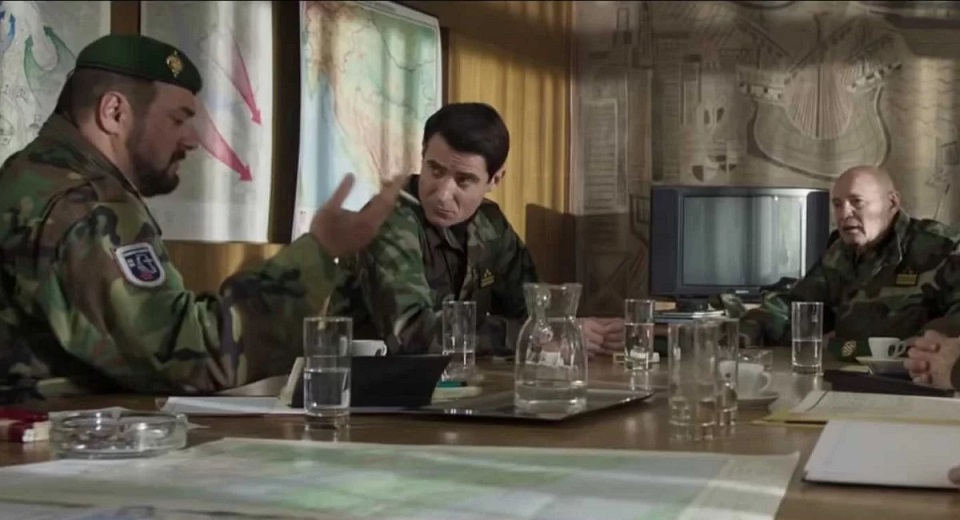
"It's About Croatian Taxpayer Money"
"It is incomprehensible to me that those in charge of the HRT and HAVC publicly funded joint project, which at one time had received a designation of project of state importance, treat their associates this way by not paying them. Because taxpayer money is involved, I think it is time to speak up regarding this topic. Neither HRT nor HAVC are legally responsible for this situation because we all signed a contract with Kiklop film, but the responsibility of the producer is in question as well as the mechanism for monitoring the spending of public funds.
“If they release my work into the public domain at home and abroad without fulfilling my financial obligations, or the obligations of those without whom there would have been no final product, then we are all in serious trouble. After two years, and in good faith, I communicated regularly with the producer and patiently considered their reasons for the late payment, which were mainly directed towards HRT and HAVC. The producers were supposedly expecting a payment of settlement funds from them, but I eventually decided to resolve the issue through legal means and filed a motion for payment enforcement based on a credible document. An enforcement order was issued and then the producer lodged an unfounded complaint on the same grounds, solely because of the reason for payment delay," Navojec writes in a statement.
Index contacted everyone mentioned in Navojac's statement and they have confirmed his allegations. Nadarević agreed to allow Index to mention his name, while Knezović, Maloča and Siladi from Gripfilm provided more specific details. Knezović received 20,000 EUR from the Bosnian Cinematography Foundation and spent 48,000 EUR which the producers were aware of. He eventually had to cover the excess costs himself. Gripfilm claims an unpaid bill of 420,000 HRK (56,500 EUR) and has initiated foreclosure proceedings, but Maloča refused to say how much the Vrdoljaks owe him, "certainly more than 100,000 HRK (13,400 EUR)," he claims.
Vrdoljak Team and HAVC Won’t Talk, HRT Saying Little
Index sent Andrija Vrdoljak an email which he did not respond to. They also called him, but he didn’t answer, just like his father, Antun Vrdoljak. So far, the Croatian Audiovisual Center (HAVC) has not responded to Index's emails, and Index has asked whether the producer of ‘General’ has provided them with a final financial report. HRT, however, decided to provide a short reply:
"HRT has nothing to do with the relationship between the producer of Kiklop film and HAVC. HRT fulfilled its obligations to an independent producer and acquired the right to use the work and broadcast the work in accordance with the acquired rights. The independent producer provided a spending statement," which indicates that they are the only party who doesn’t have an objection to ‘General’.
HRT Claimed that ‘General’ Would be ‘Very Well Received by Audience’
Just over three years ago, people from HRT were much more talkative. Their website also contains information on signing the contract with Kiklop film for filming the movie and television series ‘The General’, based on the screenplay by Antun Vrdoljak, which is based on the book by Nenad Ivankovic ‘Warrior, Adventurer and General’. The contract was signed by Andrija Vrdoljak and Siniša Kovačić, then acting director-general of HRT.
Kovačić remarked that, upon his arrival at the helm of HRT, "for some reason this project was not among the most important, but during our initial meetings we decided to change that. This is an extremely important project for us," Kovačić emphasized, and the visionary predicted that ‘General’ would "be very well received by the audience because of the strong writing team behind the script and direction team, which have already produced numerous blockbuster films and TV series."
Kovačić left HRT, in the meantime, and ‘General’ has proven to be a total artistic and financial failure. And HRT, regardless of that failure, is still broadcasting it during prime-time hours.
“This is Croatia,” Index concludes.
Check out our Lifestyle page to follow the releases, successes, failures and unpaid debts of films made in Croatia.
Croatian Politicians Speaking English: Top Ten Review
Having a working knowledge of the English language is probably not necessary for all Croatian politicians. But for Damir Krstičević, who negotiates major international arms deals, or Dubravka Šuica, who represents Croatia in the European Parliament, the ability to communicate effectively in English would seem essential. And they make up the foundation of the image Croatia presents to the world.
A recent video of Krstičević, Minister of Defense and Deputy Prime Minister of Croatia, struggling through a speech in English at an event in the United States went viral. It was then rapidly incorporated into a spoof advertisement for a "Basic English For Dummies" language course on a local Croatian comedy TV show. And Index recently posted a video montage of Dubravka Šuica, HDZ member of EU parliament and Vice President of the European Commission, attempting to communicate to her audience in English, even though she obtained a college degree in the language.
RTL Direkt created a video montage of Croatia’s top politicians speaking English on January 10, 2020. And TCN included a video of attempts by RTL Direkt to interview Croatian politicians in English, which occurred on the same day, and also revealed mixed results.
Here’s a closer look at ten of the most powerful Croatian politicians giving speeches or interviews in English, from best to worst, plus a surprise bonus at the end. Politicians' English-speaking abilities are rated on the following four criteria: fluency, grammar, vocabulary and accent.
#1 Kolinda Grabar-Kitarović
The current Croatian President’s English-speaking skills are flawless. Not only does she deserve a number one ranking, but she’s in that number one spot by far. Grabar-Kitarović spent a year in Arizona in the 1980’s as a high school exchange student and speaks English with a strong Southwestern American accent. Her confidence in the language is obvious and well-deserved. In this interview with Good Morning Britain, she discusses her views on Brexit and the challenges of being a woman in Politics.
Fluency: 5
Grammar: 5
Vocabulary: 5
Accent: 5
Total: 20
#2 Andrej Plenković
The current Croatian Prime Minister is proficient and confident in English. He speaks with a slight Croatian accent with palatalized t’s and rolled r’s. He pronounces Theresa May’s first name with a “th” rather than a “t”. In this interview with France 24, he discusses Brexit, Catalonia independence and other EU topics.
Fluency: 5
Grammar: 5
Vocabulary: 5
Accent: 3
Total: 18
#3 Zoran Milanović
The former Croatian Prime Minister and current President-Elect also shows a strong command of English. He pronounced “th” with a soft “d” or “t” and misses some a’s and the’s in his sentences. He discusses the 2015 Migrant Crisis in Croatia in this video with France 24.
Fluency: 5
Grammar: 4
Vocabulary: 4
Accent: 3
Total: 16
#4 Ivo Sanader
The former Croatian Prime Minister, who is serving a 6-year prison sentence for corruption, also appears to have a strong command of English. He rolls his r’s and missed some the’s and a’s. In this video for AP, he provides a brief summary of his meeting with former US President George W. Bush.
Fluency: 5
Grammar: 4
Vocabulary: 4
Accent: 3
Total: 16
#5 Ivo Josipović
The former President of Croatia speaks a more heavily palatalized version of Croatian-English. His delivery is slower, with short pauses. Like others, he misses some the’s and a’s, and pronounces th’s with a very soft “d”. In this interview for TRT World, he discusses his return to music and plans to compose a musical about John Lennon.
Fluency: 4
Grammar: 4
Vocabulary: 4
Accent: 3
Total: 15
#6 Davor Bernardić
The current President of SDP speaks a slightly palatalized English and his sentences also miss the’s and a’s. He pronounces the word happy “heppy” and his speech at the International Crime and Punishment Film Festival, as recorded by the Ahmadiyya Muslim Community, was very brief, which suggests a limited working vocabulary.
Fluency: 3
Grammar: 4
Vocabulary: 3
Accent: 3
Total: 13
#7 Dubravka Šuica
The current HDZ member of EU parliament, Vice President of the European Commission and former Mayor of Dubrovnik, received a degree as “Professor of English” according to media reports. Her Croatian-English, as compiled in a recent Index video, is so heavily accented that it’s almost intelligible. In addition to heavy palatalizing and missing the’s and a’s; she comes up with several humorous sentences and word segments including:
“I don’t need anyone’s emotions here.”
“This is closed circle.”
What’s even more humorous about her “massacre” of English is her disproportionately confident delivery. Her behavior suggests that of a very senior esteemed college professor casually gifting her vast pool of knowledge to a group of eager students, who hang on to her every word. Not only is that not the case; she doesn’t seem aware that the joke is on her. Simply not understanding what she was trying to say wasn’t the only reason EU parliament members might have appeared perplexed or unimpressed.
Fluency: 2
Grammar: 2
Vocabulary: 3
Accent: 2
Total: 9
#8 Jadranka Kosor
The former Croatian Prime Minister is clearly uncomfortable reading her speech in English at the 2010 Zagreb Annual Meeting and Business Forum as recorded by Radio Federacije BiH. At one point she stumbles on the name of an organization and reverts to Croatian. Her delivery is heavily palatalized and filled with most of the common letter mispronunciations including rolled r’s and separated g’s. Her struggle suggests that her knowledge of English is probably very limited and she seemed particularly eager to sit down at the end of her short speech.
Fluency: 1
Grammar: 2
Vocabulary: 2
Accent: 2
Total: 7
#9 Damir Krstičević
This is the viral video of Damir Krstičević, Minister of Defense and Deputy Prime Minister of Croatia, speaking English at an event in the United States. It was later integrated into a spoof commercial “Basic English for Dummies” on the Croatian TV show Prime Time on N1. Like his HDZ contemporary, Dubravka Šuica, Krstičević comes up with several curious phrases:
“The same idylls we fought for in our honor war.”
“Keep in mind that every success is merrily a stepping-stone to new challenge.”
At the end of his speech, he suggests:
“You ask me great questions. Ah…probably I will speak in Croatia, and my advisor…she will translate, if you agree.”
Fluency: 1
Grammar: 2
Vocabulary: 2
Accent: 1
Total: 6
#10 Ingrid Antičević Marinović
A former member of Prime Minister Ivica Račan’s cabinet and current justice of the Croatian Constitutional Court, the Honorable Justice Antičević Marinović speaks English with a lovely Croatian-Italian accent. Many of her words and sentences end with an extra soft “a” syllable, which gives her diction an oddly pleasant lilt, even though her content is virtually unintelligible. In this 2013 video, she discusses the problem of corruption in Croatia.
“I think-a it’s a job-a that never-ending ending-a. It’s-a our permanent task.”
Fluency: 1
Grammar: 2
Vocabulary: 2
Accent: 1
Total: 6
#BONUS Milan Bandić
In this Index video, the infamous Mayor of Zagreb is asked “What are you wearing tonight?”
“Yes,” he answers a few times.
After a few more attempts by the interviewer, he answers “speaking Croatia.”
Fluency: 0
Grammar: 0
Vocabulary: 0
Accent: 1
Total: 1
Follow our Politics page for more information on the English language speaking skills of prominent Croatian politicians, and important developments taking place during Croatia’s six month EU presidency.
Flights to Croatia: Air France Boosts Service between Paris and Zagreb
January 12, 2020 - The latest news from around Croatia’s airports for new flights to Croatia with updates from Zagreb, Dubrovnik, and Split.
Ex Yu Aviation reports that Air France announced that it is boosting its service between Paris and Zagreb, adding a second daily flight for this summer. Thus, Air France will operate from Paris to Zagreb in the morning and evening every day this summer out of Charles de Gaulle Airport. The new service will begin in May.
Recall, Croatia Airlines already operates one daily service from Zagreb to Paris.
In other flight news, we should see significant growth between Croatia and Greece this summer. Namely, Ex Yu Aviation reports that this is due to more destinations, higher capacity and three airlines operating between the two countries. This news comes after Aegean Airlines submitted a nonbinding bid to acquire Croatia Airlines. Thus, Aegean will increase capacity on all of its routes to Croatia this summer.
Aegean will run three services per week between Athens and Zagreb, using the Airbus A319 twice per week and the A320 once per week. Aegean will exclusively use the A320 on its five flights to Dubrovnik, while the A319 will service Split four times per week. Aegean has also expanded its codeshare partnership with Air Serbia to include Dubrovnik, Pula, Rijeka, Split, Zadar and Zagreb.
Ex Yu Aviation adds that Croatia Airlines will operate from Zagreb to Athens via Dubrovnik six times per week. This route will be serviced by Dash 8s and Air Nostrum Bombardier CRJ1000 jets.
Spanish low-cost carrier Volotea will operate three flights per week between Athens and Dubrovnik this summer, while a new service between Athens and Split will run twice per week starting April 19, and a new route from Mykonos to Dubrovnik from May 30. As reported earlier, this is the first time Croatia will be linked with a Greek city other than Athens.
“These are very attractive additions for a very dynamic market in which we believe there is still good room for growth,” said Carlos Munoz, CEO and Founder of Volotea.
Over thirty-three thousand Greek tourists visited Croatia in 2018.
To read more about travel in Croatia, follow TCN’s dedicated page.
Euro 2020: Croatia Handball Moves into Second Round after Win against Belarus
January 11, 2020 - The Croatia handball team defeated Belarus in Graz 31:23 (15:10) in the second match of Group A at the European Championship. After an initial victory against Montenegro (27:21), and with Montenegro’s win against Serbia, the ‘Cowboys’ secured first place in the group and the second round of the tournament in Vienna.
Igor Karacic scored six goals for Croatia, while Luka Stepancic scored five, Domagoj Duvnjak scored four, and Luka Cindric and David Mandic scored three goals. Goalkeeper Marin Sego recorded seven saves. For Belarus, Mikita Vajlopau scored eight goals.
Lino Cervar's side opened the match excellently against Belarus. After the initial score of 1:1, they only increased their lead. After 11 minutes of play, Croatia led 6:2, and in the next minute came a five-goal advantage (7:2). Belarus managed to reduce the gap to two for 7:5. After Belarus came just a goal behind (7:6), Cervar called for a timeout.
With two Karacic goals, Croatia was up by 3 for 11:8 in the 25th minute of the match. Cindric scored for 13:10 with two minutes remaining and Karacic’s new goal put Croatia up by 4 for 14:10. At 113 kilometers per hour, Cindric scored for 15:10. Croatia was then a player up.
Duvnjak scored to open the second half and Croatia led 16:10. A Sego save was followed by Mandic's goal for 17:10. Stepancic increased the lead to +8 (18:10). Two more Stepancic goals followed, first for 20:11, then for 21:12. In the 44th minute, Croatia was up by10 for 24:14. Cervar finished the match by trying new combinations and rested the most important players. Josip Sarac scored two goals and Matej Asanin came in for Sego.
The Montenegro handball team defeated Serbia 22:21 (11:10) in the second game of Group A. With this outcome, Croatia secured first place in the group and will move on to the second round in Vienna, where they will transfer a maximum of two points. Thus, the Croatia-Serbia meeting on Monday is irrelevant.
Group A (Graz):
CROATIA - Belarus 31:23 (15:10)
Montenegro - Serbia 22:21 (11:10)
1. CROATIA 2 2 0 0 58:44 4
2. Belarus 2 1 0 1 58:61 2
3. Montenegro 2 1 0 1 43:48 2
4. Serbia 2 0 0 2 51:57 0
Source: HRT
To read more about sport in Croatia, follow TCN’s dedicated page.
Trogir Flooded Twice in 2019: Seaboard Repairs Not Enough
In ten days, repairs will begin on a damaged section of the Čiovo seaboard in Trogir. Therefore, Čiovo residents will finally have seventy meters of their damaged and destroyed seaboard repaired, but repairs won't be enough, the city's mayor warns.
Trogir is a historic town and harbor on the Adriatic coast in Split-Dalmatia County, Croatia, and has a total municipal population of 13,260. The historic city of Trogir is situated on a small island between the Croatian mainland and the island of Čiovo. It is located 27 kilometers west of the city of Split.
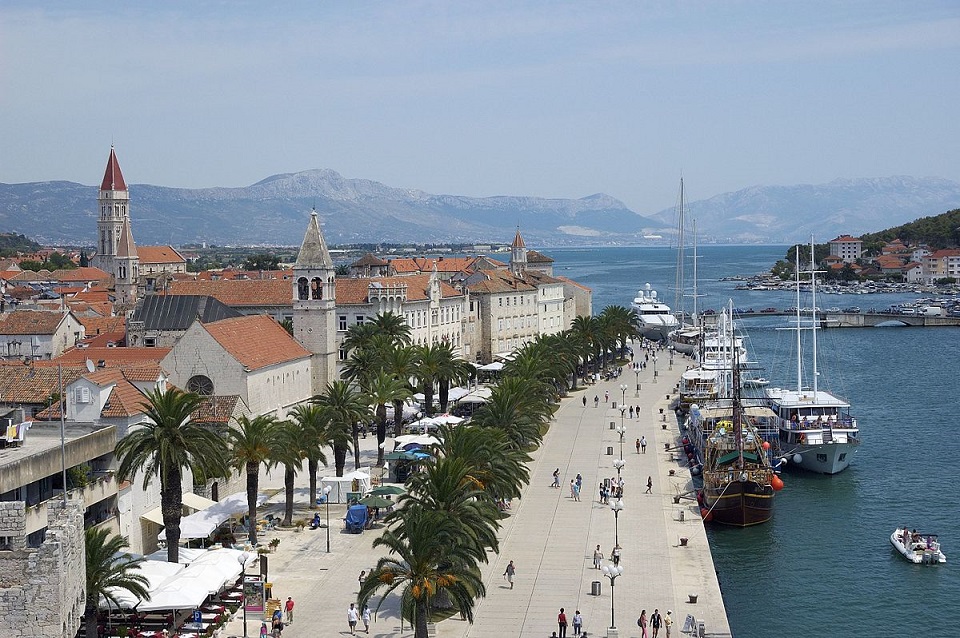
Trogir | Wikimedia Commons
The historic center of Trogir has been included in the UNESCO list of World Heritage Sites for its Venetian architecture since 1997.
“This investment is worth around 500,000 HRK (67,100 EUR). We had a problem with a ship which was illegally docked, but we have resolved it and the project should be finished in three months. In addition, we plan to make additional improvements the seaboard, port authority and town square,” said Ante Bilić, the mayor of Trogir.
Both the Čiovo and Trogir shorelines ended up underwater twice last year, in November and December. Many other Dalmatian cities have been experiencing similar fates according to HRT on January 9, 2020. Extreme windstorms (Bora), heavy rainfall and a sudden rise in sea level could be disastrous for coastal areas.
“It has happened in the past, but not as frequently. This can hardly be solved by raising the seaboard level because flooding also occurs from catchment and stormwater. We need to discuss these issues at the state level and with ministry of the environment, because this is everyone’s problem,” explained Mayor Bilić.
Scientists have been warning that sea levels could rise from 40 to 120 centimeters in the next hundred years. Without serious investment into preventative projects, the question is who will end up in the "front row to the sea."
Follow our Lifestyle page for updates on environmental concerns and the effects of climate change in Croatia.
Croatia Kvarner Region Tourist Traffic Up 50 Percent in 10 Years
Kvarner's tourist traffic numbers continue their upward trajectory. The Kvarner region, located in Northwestern Croatia, finished 2019 with 3.1 million arrivals and 19.1 million overnight stays. Compared to 2018, there were 2% more arrivals and 1% more overnights. Overnights also increased by 3% compared to 2017, 13% compared to 2016 and 50% compared to 2010.
During peak season, overnight stays remained at last year's levels, with an average occupancy of 25 days, and 30 days at hotels. That means that there wasn't a lot of room for growth during the the busiest season of the year, according to MorskiHR on January 8, 2020. Therefore, it is important to emphasize that overnight more stays increased by 1% during pre-season, while the post-season overnight stays increased by 4%. The increase in overnights during pre and post-season is more significant when compared with results from 2010, and it shows that overnights during these times of the year increased by 90%, according to the tourist board.
Germany Traditionally Strongest Market
In 2019, 630,000 German guests visited the Kvarner region, resulting in almost 4.7 million overnight stays. This figure has certainly been influenced by the large number of promotions directed toward the German market. In addition to Germany, three more markets have reached more than one million overnights: Slovenia (3 million), Austria (1.8 million) and Italy (1.3 million). The share of foreign traffic for these four countries is nearly 70%.
Kvarner’s inclusion on group tour routes which take guests from distant markets to Europe has also resulted in a large increase in traffic from these markets. In the last 3 years, guests from China have almost tripled their number of overnight stays while US citizens have increased their overnights by 50%.
Guests from the United Kingdom are also worth mentioning. They spent 137,000 overnights in Kvarner which is 25% increase from 2018, and 44% increase from 2016! Foreign tourists account for 85% of overnight stays and domestic tourists 15% (3 million nights, an increase of 5%).
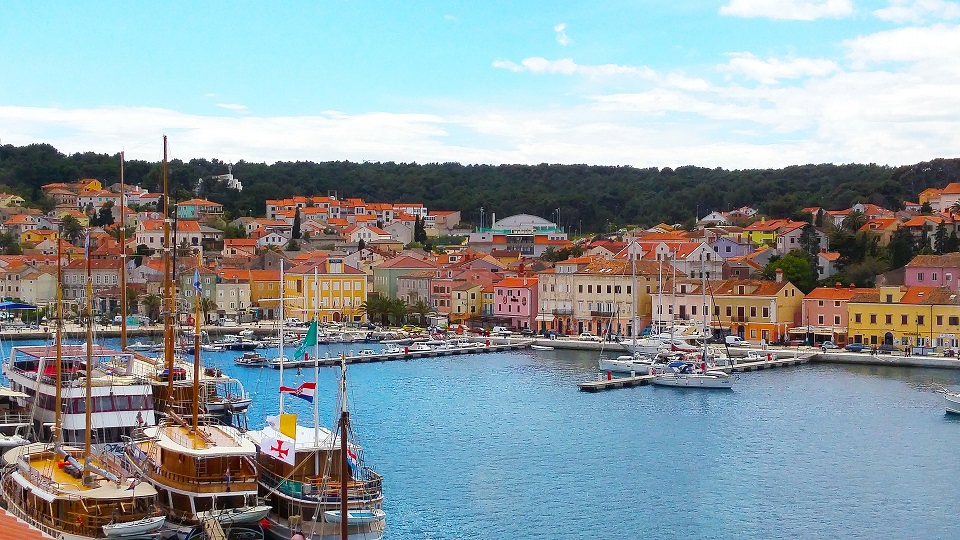
Mali Lošinj
Most Guest Overnights on Island of Krk
Among the subregions, the island of Krk is in the lead, with an increase of 1% and 7 million overnights (and has a 36% share of total overnights in Kvarner).
The Crikvenica-Vinodol Riviera ranks second (3.2 million) followed by the island of Losinj (2.4 million). The number of overnight stays continues as follows: the Opatija Riviera and the island of Rab (2.2 million), the island of Cres (1.1 million), the Rijeka area (925,000) and Gorski Kotar (110,000). The highest percentage increase in overnight stays (14%) was recorded in the Rijeka area.
Mali Losinj (2.4 million nights) and Crikvenica (2.2 million nights) are among the "best" destinations.
Guests Prefer Croatia Family Accommodations
Family accommodations accounted for 40% of recorded overnight stays (7.7 million). Campsites and hotels recorded almost the same number of total overnights: 3.7 million each with individual shares of 19%.
The highest increase in overnights was recorded in upper-category accommodations:
- Hotels generally realized 1% more overnights. However, 4 and 5-star hotels enjoyed a 6% increase.
- All family accommodations experienced a 1% increase in overnight stays, but 5-star family accommodations enjoyed a 38% increase!
- A similar scenario applies to campsites: there was an overall 1% decrease in overnight stays, but overnights at 5-star camps are up 22%.
Regardless of the type, 5-star facilities have seen 15% increase in overnight stays during the past year and 70% increase overnight over the last 3 years!
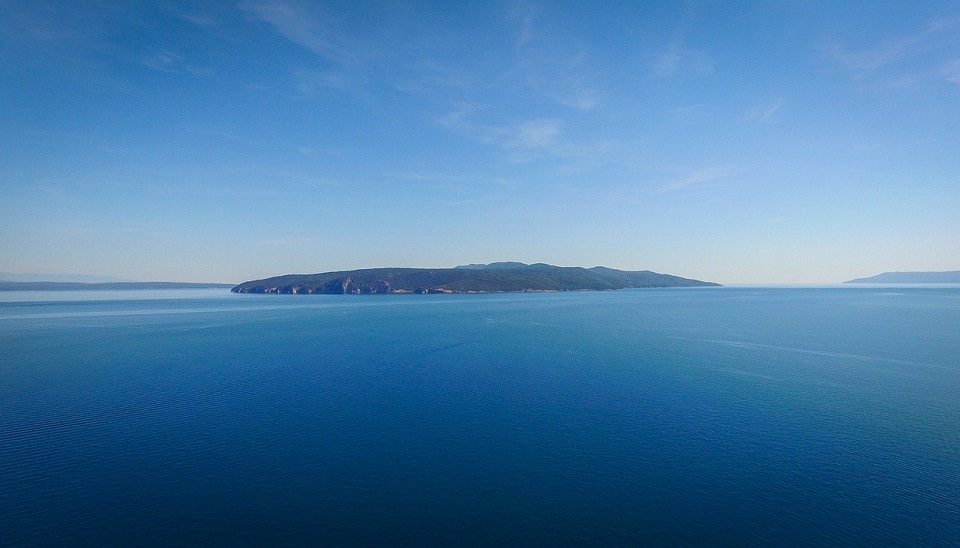
Cres
Nautical Tourism Overnights Up Thirty-Two Percent
These figures do not include 24,500 arrivals and 156,000 overnight stays due to nautical traffic, which in has increased by as much as 32% the last year alone. There are about 20 nautical tourism ports in Kvarner, and Marina Punat alone accounts for more than half of nautical overnights.
Kvarner Third to Istria and Split-Dalmatia in Accommodation Capacity
As of 2019, there are 190,000 permanent beds available for tourists in Kvarner which represent a 17% share in accommodation capacity within Croatia. The Kvarner region ranks third in terms of total available accommodation, which is behind Istria and Split-Dalmatia counties in Croatia.
Irena Peršić Živadinov, Director of the Kvarner Tourist Board, emphasizes that the primary goal is to strengthen the pre and post-seasons, because one cannot always count on a record “peak” season.
Kvarner Tourist Board Expects Long-Term Increase
“In recent years, the Kvarner region has definitely succeeded in strengthening the pre and post-seasons. Compared 2010 to 2019, we have seen a huge increase in overnight stays during both seasons - almost 90%! Over the past 10 years, we have invested in the quantity and quality of the regions’ offerings. We have also focused on joint branding and activities and recognized our strengths regarding products and offerings."
“These steps probably won’t yield immediate results but will take a longer time to have an effect. Taking that into consideration, for example, 12.7 million overnight stays were recorded in 2010, it is clear that in a period of 9 years we have realized 6.3 million more overnights, or the total number of overnights in Kvarner ha increased by almost 50%,” Peršić Živadinov points out.
Follow our Travel page to keep up-to-date on tourism trends in Croatia.
Croatian Boy Walks After Successful Brain Implant at Dubrava Clinic
The neurosurgery team at Dubrava Clinical Hospital has achieved another success. A 10-year-old Croatian boy from Dalmatia, who was paralyzed due to a rare disease, has received a deep brain stimulator implant. Just three months after surgery, the boy is walking.
After a five-year search, the parents of the 10-year-old boy finally learned about his diagnosis. A rare disease, dystonia, is a condition in which the brain has no control over muscular activity and was the cause of all their son's problems. They sought help from Professor Chudy at KB Dubrava (Dubrava Clinical Hospital), according to Ruža Ištuk/Dnevnik/HRT on January 8, 2020.
Their son underwent surgery three months ago, and they say that the results are amazing. The boy is speaking more clearly, sits without help, can control his movements and walk.
“I feel wonderful. It's like a new birthday for me. I don't know how to describe the feeling as a parent. It's a big deal to have a child who has a (medical) problem, and then everything gets better. It’s phenomenal, said the boy's parent.
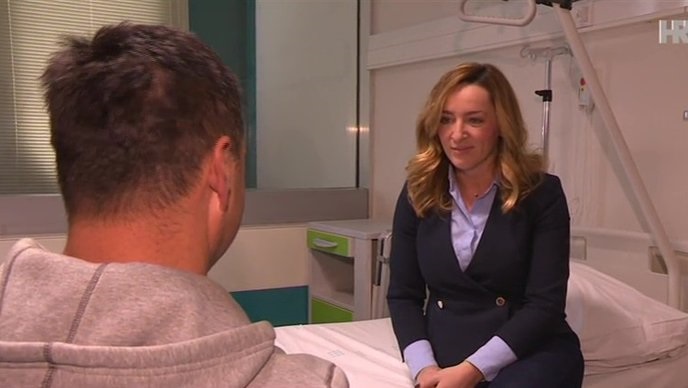
Professor Darko Chudy, head of the Department of Neurosurgery at KB Dubrava, said he expects the boy to become independent and to have the same life opportunities as other boys.
"This stimulator works like a trigger which enables muscles to follow orders," Chudy explained.
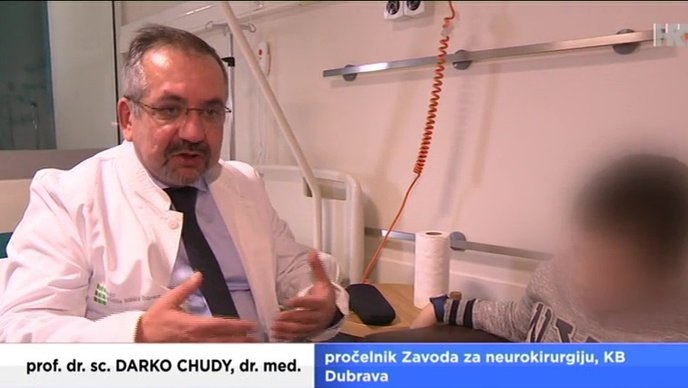
“There’s no better feeling. It motivates you to keep going and become even better at what we do so that our patients are happy and satisfied, said Fadi Almahariq, neurosurgeon at KB Dubrava.
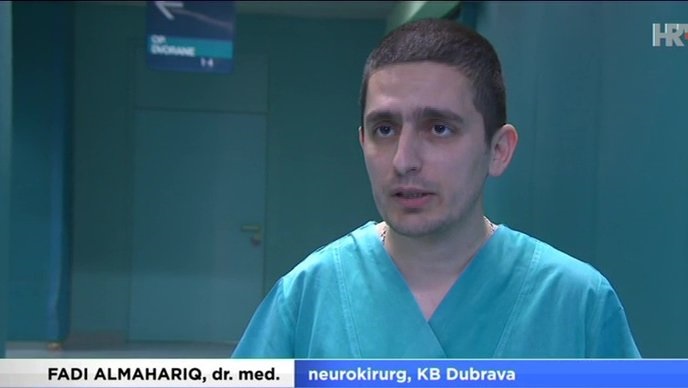
Veronica Paradžhik, the boy's physical therapist, is also delighted as the improvements are becoming increasingly visible.
"It was only after the stimulator was installed that physical therapy sessions began to show results," Paradžhik revealed.
The boy is now undergoing spa therapy and his condition is expected to further improve.
Follow our Lifestyle page to stay updated on Croatian medical advancements.
ATP Cup Sydney: Argentina Sweeps Croatia 3:0, Ending Quarter-final Dream
January 8, 2020 - The Croatia tennis team remains without the quarter-final of the premiere edition of the ATP Cup.
After celebrating in the first two rounds of Group E, Croatia faced the worst-case scenario in Sydney on Wednesday. Namely, Croatia lost all three matches to Argentina (3:0) and thus ended their run in the group for second place. After losing both singles matches (Marin Cilic lost to Guido Pella, ATP 25th) 7:6 (1), 6:3, and Borna Coric lost to Diego Schwartzman (ATP 13th) - 6:2, 6:2, they needed a win in the last doubles match to be in the top eight as the best runner-up. However, Ivan Dodig and Nikola Mektic failed to record an important point and were conquered by Maximo Gonzalez and Andres Molteni - 3:6, 6:3, 10:2.
Cilic started well in the first match, leading 4:1, but then lost his serve for the first time in the tournament, and later the first set. In the second, he held on to 2:2, but in the end, it was Pella to win for the third time in their fourth encounter.
Coric lost to Schwartzman in 75 minutes. The Argentina player saved both of Coric’s breaks, while the Zagreb native scored just 12 points on his opponent’s serve. It was their fourth encounter and Schwartzman's second win.
In the final doubles match, Dodig and Mektic quickly won the first set (6:3), though Argentina woke up, started to play and smoothly took the second. With complete dominance in the decisive tie-break, Argentina concluded the duel in their favor.
Thus, Belgium and Canada placed second for a spot in the quarter-final.
The quarter-final of the first ATP Cup includes Australia - UK, Argentina - Russia, Serbia - Canada, and Spain - Belgium. All matches will be played at the Ken Rosewall Arena in Sydney.
Final standings in Group E: 1. Argentina 2:1, 2. Croatia 2:1, 3. Poland 1:2, 4. Austria 1:2.
Source: HTS
To read more about sport in Croatia, follow TCN’s dedicated page.


